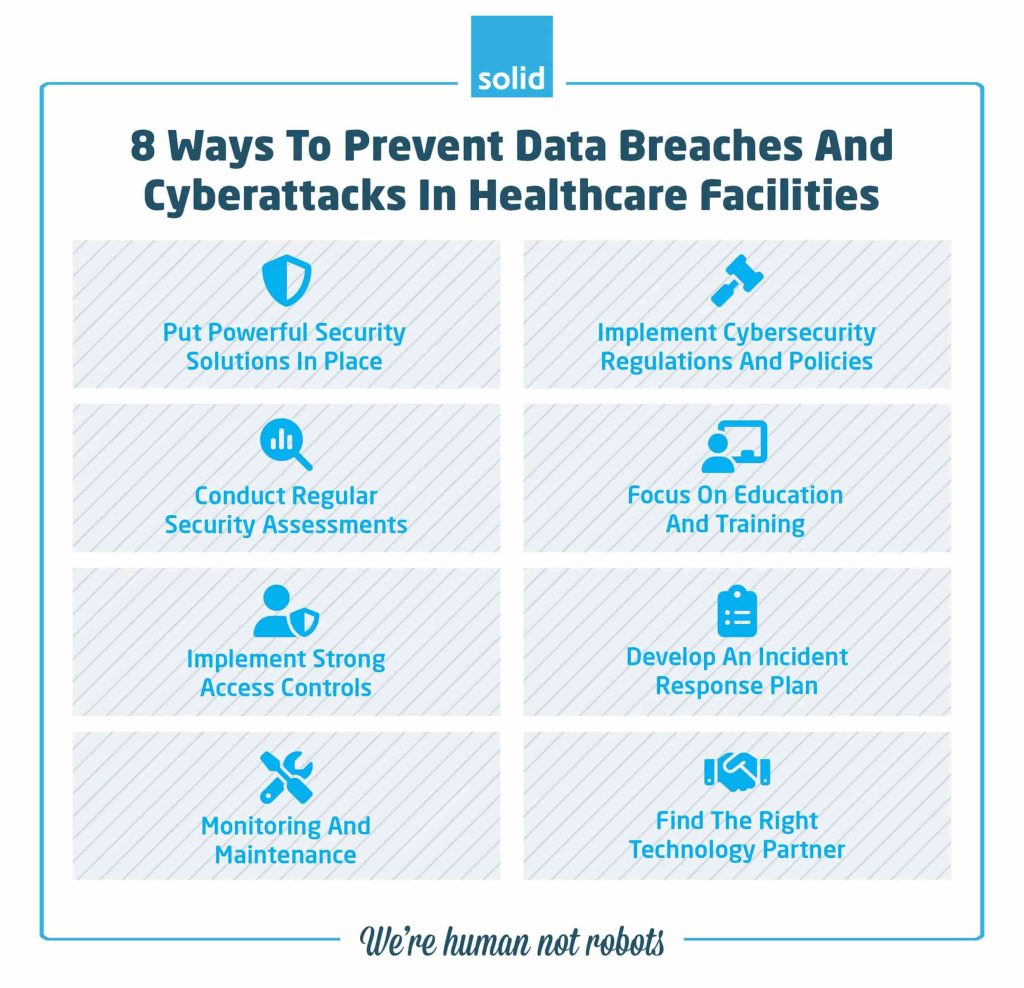
The healthcare industry is one of the most targeted sectors when it comes to cyberattacks. With sensitive patient data and critical infrastructure at risk, cybersecurity for healthcare has never been more critical. In this article, we will explore why cybersecurity is a significant concern for healthcare providers and what measures they should be taking to protect themselves from cyber threats.
Why is Cybersecurity More Critical in Healthcare?
Healthcare is an intricate industry, and one where technologies play an important role not only in storing valuable data, but in helping to analyse information, diagnose diseases, and provide the exceptional service that people expect when consulting with medical professionals.
All of this means that when it comes to cybersecurity threats, healthcare providers and facilities are at a huge amount of risk.
The healthcare industry deals with highly sensitive patient data, including personal information, medical records, and financial details. This makes it a prime target for cybercriminals who can exploit this information for financial gain. The consequences of a security breach in healthcare can be devastating, not only financially but also affecting the lives of patients and the reputation of the healthcare provider.
On top of the data concerns, there is also the fact that many cyberattacks aim to cripple the businesses that they target, bringing operations to a grinding halt. When it comes to healthcare facilities, this can involve employees not having access to patient records, not being able to communicate between different departments, and can severely impact not only on patients’ privacy and the company’s reputation, but on the care that they are able to receive.
What are the Most Significant Cyber Threats Affecting Healthcare Facilities?
While cyberattacks come in all shapes and forms, the biggest threats to cybersecurity for healthcare providers over the past few years have largely been data-related. Because healthcare providers work with such sensitive information, and because an attack to their network or systems can have a devastating effect on patient care, it’s clear to see that cybersecurity and healthcare go hand in hand. Some of the most pressing cyber threats that healthcare facilities should be protecting themselves against include:
• Phishing Attacks
Phishing attacks are one of the most common forms of threats in cybersecurity for healthcare. With emails disguised to look like legitimate requests for information or credentials, employees can unintentionally give hackers access to sensitive data, or download malware onto company devices which can allow them to gather significant amounts of data over a long period of time.
• Insider Threats
Insider threats are a significant risk to healthcare facilities, as employees may intentionally or unintentionally expose sensitive data. This could be through malicious actions such as stealing data for personal gain, or simply by clicking on an email link without realising the potential consequences. Proper employee education and strict access controls can help to mitigate these risks.
• DDoS Attacks
Distributed Denial of Service (DDoS) attacks can be especially crippling for healthcare providers, as they involve overwhelming a network with an excessive amount of traffic, ultimately causing it to crash. This not only means that patient data is inaccessible, but also that critical systems and medical equipment may be taken offline.
• Malware Infections
Malware infections are another major threat in the healthcare industry. Malicious software can be designed to gather sensitive data, disrupt network systems, or even disable entire systems. This makes patient medical records and other sensitive information vulnerable to theft or manipulation.
• Social Engineering Attacks
Social engineering attacks are a growing concern for healthcare facilities. This involves using psychological manipulation techniques to trick employees into disclosing confidential information or granting access to secure systems. With the rise of social media and the increased sharing of personal information online, social engineering attacks have become more sophisticated and harder to detect.
• IoT Vulnerabilities
The rise of Internet of Things (IoT) devices in healthcare has also brought about new cybersecurity challenges. Many medical devices are now connected to networks, making them vulnerable to hacking attempts. For example, an attacker could potentially access a patient’s pacemaker or insulin pump, or a hospital’s IoT controlled heating, ventilation, air conditioning or lighting, putting health and safety at risk.
What Cybersecurity Trends Do We Expect To See In 2024?
As technology continues to evolve, so do cyber threats. Here are some of the cybersecurity for healthcare trends that we can expect to see in the industry in 2024:
• Increased Focus On Data Privacy
In light of recent data breaches and privacy concerns, the healthcare industry is expected to place a greater emphasis on protecting patient data. This includes implementing stronger encryption methods, access controls, and data backup protocols.
• Adoption Of Artificial Intelligence
Artificial intelligence (AI) is being increasingly used in the healthcare sector for tasks such as diagnosis and treatment planning. However, with this comes new cybersecurity risks. In the coming years, we can expect to see the adoption of AI-driven security systems to combat these threats.
• Integration Of Internet Of Things Security
With the growing number of IoT devices in healthcare, there will be a greater need for robust security measures. This may include the integration of blockchain technology and other advanced security protocols to protect sensitive data and prevent unauthorised access to medical devices.
What Cybersecurity Measures Should Healthcare Providers Be Focusing On?
In order to protect against cyber threats, healthcare providers should be focusing on the following cybersecurity measures:
• Email Security
Email remains one of the most common attack vectors for cybercriminals. Healthcare providers should implement email security measures such as strong spam filters and encryption to prevent phishing attacks.
• Phishing Awareness Training
While there are a number of different email security risks that healthcare providers face, phishing attacks are one of the most common methods of email attacks. It is important for employees to be aware of the different types of phishing scams and how to identify them. Regular training can help prevent successful phishing attacks.
• Physical Security
Physical security is just as crucial as digital security in healthcare facilities. This includes measures such as CCTV cameras, access controls, and secure storage for sensitive data. Physical security measures can prevent unauthorised access to devices and data, reducing the risk of cyberattacks.
• Legacy Systems
Legacy systems are often outdated and lack adequate security measures. When it comes to cybersecurity for healthcare, providers should focus on updating these systems or replacing them with more secure alternatives to protect against cyber threats.
8 Ways To Prevent Data Breaches And Cyberattacks In Healthcare Facilities

In addition to the specific cybersecurity measures mentioned above, here are 8 ways healthcare facilities can prevent data breaches and cyberattacks:
1. Put Powerful Security Solutions In Place
Healthcare providers should have robust security solutions in place, including firewalls, intrusion detection and prevention systems, antivirus software, and regular backups of critical data. Having a platform like Microsoft which can accommodate a wide range of security solutions including endpoint protection, identity and access management, secure cloud storage and more will be an asset, since it will be significantly easier to manage permissions and security settings across Microsoft apps and tools than it would be to manage multiple different security solutions that don’t integrate across each other.
2. Implement Cybersecurity Regulations And Policies
Compliance with industry regulations such as the General Data Protection Regulation (GDPR) and the Health Insurance Portability and Accountability Act (HIPAA) is crucial in maintaining cybersecurity for healthcare. These regulations provide guidelines for protecting sensitive data.
Healthcare providers should also focus on implementing regulations within their own organisations on top of remaining compliant with regulations. With a rise in employers allowing their teams to use their own personal devices for work purposes, having strict Bring Your Own Device (BYOD) guidelines in place that ensure that any devices being used to access personal or confidential information are updated, maintained and secured, is critical.
3. Conduct Regular Security Assessments
Regular security assessments can identify any vulnerabilities or weaknesses in a healthcare facility’s cybersecurity measures. This allows for businesses to address any shortcomings or concerns before they result in a cyberattacks occurring. Conducting regular security assessments also helps healthcare providers stay compliant with regulations.
4. Focus On Education And Training
Human error is often a significant cause of data breaches and cyberattacks in healthcare. This makes educating employees on the importance of cybersecurity for healthcare providers critical. Training your teams on how to recognise potential threats, and providing them with best practices for protecting sensitive data can greatly reduce the risk of cyberattacks. This includes teaching employees how to identify phishing emails, avoid social engineering tactics, and maintain strong passwords.
5. Implement Strong Access Controls
Limiting access to sensitive data and implementing strong access controls can prevent unauthorised individuals or hackers from gaining access to confidential information. This includes restricting physical access to devices and networks, implementing identity and access management solutions, using Multi-Factor Authentication (MFA), and regularly auditing user permissions. By implementing strong access controls, healthcare providers can ensure that only authorised personnel have access to sensitive data.
6. Develop An Incident Response Plan
In the event of a cyberattack or data breach, having an incident response plan in place is critical. This should include steps for identifying and containing the attack, notifying affected individuals and authorities, and restoring systems and data. Regularly testing and updating this plan can help healthcare providers respond quickly and effectively in the event of a cyberattack.
7. Monitoring And Maintenance
Proactive monitoring and maintenance are essential for detecting and preventing cyber threats in healthcare facilities. This includes regularly checking for software updates, implementing firewalls and intrusion detection systems, and conducting vulnerability scans. By continuously monitoring and maintaining systems, healthcare providers can stay ahead of potential cyber threats.
8. Find The Right Technology Partner
Given the complexity and ever-changing nature of cybersecurity, healthcare is an industry that can gain massive benefit from partnering with a trusted technology provider. A company like Solid Systems can offer specialised expertise in protecting sensitive data and implementing effective cybersecurity measures. Choosing the right technology partner can greatly enhance a healthcare facility’s overall security posture.
What Makes Solid Systems The Right Technology Partner?
With over two decades of experience in implementing cybersecurity solutions for companies across the globe, Solid Systems is perfectly placed to help healthcare facilities protect their data, their operations, their employees and their patients.
Our certified IT Pros have a wealth of experience behind them, and an in-depth understanding of both the cybersecurity risks that healthcare facilities face on a daily basis, and the best practices for combating them. We offer exceptionally human support that goes above and beyond simply troubleshooting, and speaks directly to your business’ needs and goals, ensuring that you company and your humans are supported across your technologies, and that you’re putting the right security measures in place to protect your patients.
If you want to see for yourself the difference that working with the right Managed IT Services provider can have for your business, schedule your free consultation with our Sales team today.
Frequently Asked Questions
Cybersecurity for healthcare serves to protect patient data, ensuring its confidentiality, integrity, and availability. It safeguards systems and technologies from cyber threats, thus ensuring the smooth functioning of healthcare services. Moreover, it is essential for regulatory compliance, as healthcare providers are required by law to protect sensitive patient information. Cybersecurity also builds trust with patients, as they know their data is well-protected. Finally, it helps avoid financial and reputational losses associated with data breaches and system disruptions.
The most severe threats to cybersecurity for healthcare include sophisticated phishing attacks, internal threats from employees, Distributed Denial of Service (DDoS) attacks aiming to disrupt services, malware infections that can compromise systems, social engineering attacks that manipulate individuals into disclosing sensitive information, and vulnerabilities in Internet of Things (IoT) devices used in healthcare environments.
Cybersecurity in medical technology refers to the protection of healthcare systems, devices, and data from cyber threats. This includes securing electronic health records, medical devices, and hospital networks from unauthorised access, cyberattacks, and data breaches. It is integral to ensure patient confidentiality, service continuity, and regulatory compliance in the medical sector. This field is rapidly evolving as technology advances and the threat landscape becomes increasingly sophisticated.
Popular Searches
- What is Information Security
- IT Company in Midrand
- Cybersecurity in Banking
- IT support in Pretoria
- Email Security Tips
- Cybersecurity Tips for Employees
- IT Support in Gauteng
- Importance of IT Security
- Prevent Phishing Attacks
- IT Challenges in Finance Industry
- BYOD
- IT support in Centurion
- Threats in network Security
- IT company in Durban
- Advanced Threat Protection
- Common Cybersecurity Challenges
- Preventing Cyber Attacks
- IT company in Polokwane





